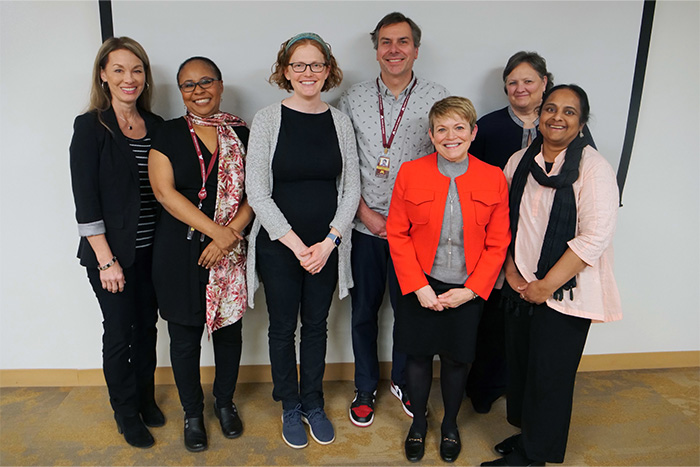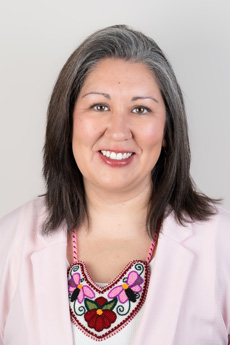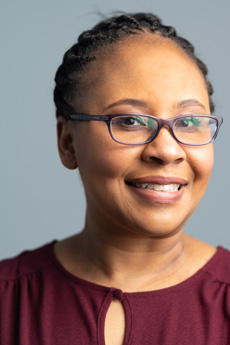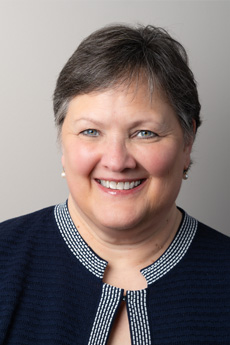School names 8 endowed chairs, professors
May 7, 2024

The School of Nursing announced the appointment of eight endowed chairs and professors. Professor Susan Gross Forneris, PhD, RN, CNE, CHSE-A, FAAN, and Clinical Associate Professor Misty Wilkie, PhD, RN, FAAN, were named holders of the Katherine R. & C. Walton Lillehei Chair in Nursing Leadership. Professor Lucy Mkandawaire-Valhmu, PhD, RN, FAAN, and Associate Professor Sripriya Rajamani, PhD, MBBS, MPH, FAMIA, were named holders of the Pauline A. Vincent Chair in Public Health. Associate Professor Melissa Horning, PhD, RN, PHN, Associate Professor Martin Michalowski, PhD, FAMIA, Associate Professor Mary Fran Tracy, PhD, APRN, CNS, FAAN, and Assistant Professor Cynthia Bradley, PhD, RN, CNE, CHSE, ANEF, were named holders of the School of Nursing Foundation Research Professorship.
In addition to providing faculty with the resources necessary to advance their research and innovations, endowed chairs and professorships are essential for recruiting and retaining the highest-quality scholars. They help create an academic environment that attracts the best students by giving them access to key learning.
Katherine R. & C. Walton Lillehei Chair in Nursing Leadership
The Katherine R. & C. Walton Lillehei Chair in Nursing Leadership was created in 2001 in appreciation for the role the University played in their lives and in the belief that education holds a society together. It is named after Katherine R. Lillehei, a nursing student in the 1940s and former School of Nursing Foundation member, and her husband C. Walton, a renowned Minnesota physician and pioneer of open-heart surgery.

Gross Forneris is associate dean for Academic Programs and has been a nurse educator for over 25 years. As a former director for Innovation in Education Excellence at the National League for Nursing (NLN), she has been working in the field of simulation education since 2003. She is instrumental in the design and implementation of faculty development courses focused on the science of teaching and learning, primarily grounded in debriefing best practices, curriculum and instruction, and learner evaluation. Forneris’ research has focused on the use of experiential teaching and learning that intersects with her research on critical thinking. This work has evolved over the years with the generation of new research on faculty development. She co-authored the publications Critical Conversations: The NLN Guide for Teaching Thinking and Critical Conversations: From Monologue to Dialogue.

Wilkie, an enrolled citizen of the Turtle Mountain Band of Chippewa Indians, created the Niganawenimaanaanig Indigenous Nursing Education Model used to provide holistic support to American Indian/Alaska Native (AIAN) nursing students. She secured $4.2 million in Health Resources and Services Administration grant funding, is recognized for establishing and sustaining academic support for AIAN nursing students across BSN and DNP programs, and is known for her commitment to inclusivity, diversity and equity work. She has served on several national inclusivity, diversity and equity committees and was appointed to the Special Medical Advisory Group for the U.S. Department of Veterans Affairs to represent AIAN veteran needs. Her passion to diversifying the workforce and educating others on AIAN culture, values, and beliefs will aid in minimizing health disparities in Indigenous relatives and communities.
Pauline A. Vincent Chair in Public Health Nursing
The Pauline A. Vincent Chair in Public Health Nursing was established in 1999 to support faculty who are developing nursing programs and providing nursing services that focus on the needs of the community at large. The chair honors the legacy of Pauline A. Vincent, PhD, MPH, RN, FAAN, who was a public health nursing leader and a 1956 alum of the University of Minnesota master’s degree in public health nursing program.

Mkandawaire-Valhmu is a nurse scientist whose expertise is on violence in the lives of women disproportionately impacted by gender-based violence due to racial/ethnic identity and socioeconomic status among other factors. Her research advances nursing science, positioning nurses as leaders in improving health outcomes for women experiencing violence. Her current studies include a National Institutes of Health-funded study to analyze American Indian and Black women experiencing violence and their access to health care and support during the COVID-19 pandemic and a University of Minnesota-funded study focused on meeting the health care needs of refugee women experiencing gender-based violence in Malawi. Mkandawire-Valhmu addresses the complex barriers that women face to health care and support when experiencing violence in their lives using feminist theory as a framework for analysis.

Rajamani’s research focuses on the use of health information technology and electronic exchange of data to improve public and population health. These tools decrease workload on providers, including nurses, by eliminating burden of manual data entries and meeting of arduous reporting requirements, in addition to providing standardized data for decision-making. She has served as a senior informatician for the state public health agency in Minnesota and as an advocate for academic-practice collaborations. She is the co-principal investigator of a multi-million dollar federal grant to build and diversify the informatics workforce in public health and co-developed a population health informatics certificate training program. Rajamani is a fellow of American Medical Informatics Association and chairs an informatics pathways program for underrepresented students.
School of Nursing Foundation Research Professorship
School of Nursing Foundation Research Professorships were established in 2011 by supporters of the University of Minnesota to advance nursing science.

Horning is committed to improving health equity by addressing social determinants of health through her teaching, service and externally-funded, community-partnered research. Horning leads a large trial funded by the National Institute of Nursing Research with her community partners. Because of her high-impact work and expertise, she has received both international and national recognition, and she serves on NIH Special Emphasis Review Panels. The overarching goal of Horning’s program of research is to improve food access, food security and dietary intake in communities that are underserved and/or marginalized. To achieve this goal, her community-engaged research rigorously tests the impact of innovative, community-led interventions, like mobile grocery stores, aiming to address these outcomes.

Michalowski is an internationally recognized leader in using artificial intelligence (AI) to improve patient outcomes through applied and methodological research in the areas of information integration, automated reasoning, heuristic-based planning, constraint satisfaction, and large language models. He is an elected senior member of the Association for the Advancement of Artificial Intelligence and one of the fellows of the American Medical Informatics Association. He authored and co-authored over 90 peer-reviewed articles published in top academic journals and international conference proceedings. Michalowski’s interdisciplinary research brings advanced AI methods and models to clinical decision support at the point of care and to patient-centered care. His scholarly work and teaching aims to empower nurses to be change leaders in the health system of the 21st century that leverages AI-based methods and models in the provision of efficient, personalized, and patient-focused care.

Tracy is the assistant dean for the PhD Program and director of Graduate Studies. She has been a certified critical care clinical nurse specialist for more than 20 years. Throughout her career she has mentored nurses and students to optimize their impact in the care of patients. She is a past-president of the American Association of Critical-Care Nurses and served on the AACN Certification Corporation and American Thoracic Society Boards. She co-founded the Minnesota Affiliate, National Association of Clinical Nurse Specialists. Tracy’s program of research focuses on symptom management for acute and critically ill patients. For example, she has been on an interdisciplinary team studying the effectiveness of patient-controlled sedation in mechanically-ventilated patients, and explored the long-term physical, emotional and mental health symptoms experienced by patients hospitalized for COVID-19.

Bradley is the director of Simulation for the School of Nursing. As a fellow in the Academy of Nursing Education and a certified health care simulation educator, she is recognized as a leader in advancing health care simulation science. She is committed to transforming the preparation of nurses with innovative simulation and debriefing methodologies. She is on the forefront of investigating emerging technologies generating higher immersion in simulated clinical learning activities that replicate real-world patient care without jeopardizing patient safety. Supported by the highly competitive Reimagining Nursing Initiative grant by the American Nurses Foundation, she is advancing the use of immersive virtual reality to improve the clinical competence of nurses.


